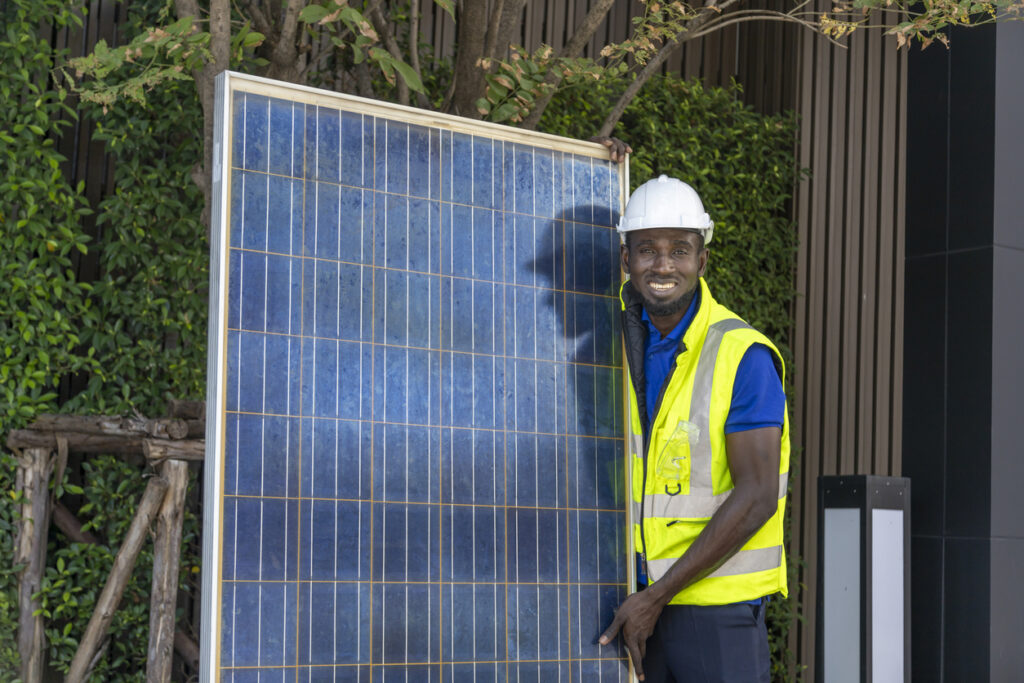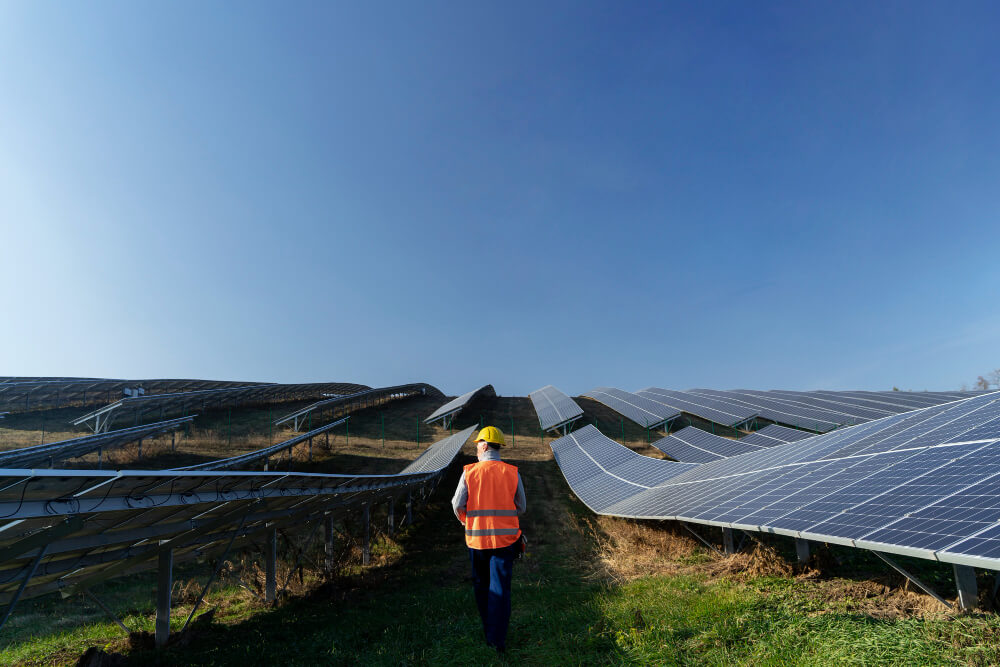Are you looking to harness the abundant sunshine in Nigeria through solar power? Finding qualified, certified solar panel installers near you is crucial for a successful solar project.
With Nigeria receiving an average of 6.5 hours of sunshine daily across most regions, solar energy presents a practical solution to the country’s ongoing power challenges.
This comprehensive guide will help you connect with the right professionals for your solar needs.

Why Solar Energy Makes Sense in Nigeria
Before diving into how to find installers, let’s briefly explore why solar energy is gaining momentum in Nigeria:
Natural Advantage
Nigeria sits close to the equator and enjoys consistent sunshine nearly year-round, making it an ideal location for solar power generation.
This natural resource remains largely untapped despite its potential to transform the country’s energy sector.
Power Reliability
With frequent grid outages and limited access to electricity in many areas, solar power offers independence from the national grid.
A properly designed solar system can provide reliable electricity 24/7 when combined with appropriate battery storage.
Economic Benefits
Though the initial investment in solar may seem high, the long-term savings are substantial.
Many Nigerian households and businesses spend significant amounts on fuel for generators.
Solar systems typically pay for themselves within 3-5 years through these savings.
Environmental Impact
Solar energy produces no emissions during operation, helping reduce air pollution – a growing concern in Nigeria’s urban centers.
Switching to solar contributes to better air quality and reduced carbon footprint.
Why Choose Certified Solar Installers?
The quality of your solar installation directly impacts its performance, safety, and longevity.
Here’s why working with certified professionals is essential:
Technical Expertise
Certified installers understand the complexities of designing solar systems that match your specific energy requirements.
They consider factors like roof orientation, shading, local weather patterns, and your energy consumption patterns.
Safety Assurance
Solar installations involve electrical work that can be dangerous if improperly handled.
Certified installers follow safety protocols to protect your property and the people who live or work there.
They also ensure systems include proper grounding and protection from lightning strikes – crucial in Nigeria’s climate.
Regulatory Compliance
Nigerian energy regulations continue to evolve as solar adoption increases.
Certified installers stay current with these regulations and ensure your installation meets all legal requirements, including permits from state electricity boards where necessary.
Quality Equipment Selection
Experienced installers can help you navigate the sometimes confusing array of solar panels, inverters, batteries, and mounting systems available in the Nigerian market.
They can identify quality equipment that will perform well in Nigeria’s unique climate conditions.
Warranty Protection
Most reputable installers offer workmanship warranties on their installations, complementing manufacturer warranties on equipment.
This comprehensive protection gives you recourse if problems arise.
After-Installation Support
Solar systems require occasional maintenance and monitoring.
Certified installers typically offer maintenance plans and can provide rapid support if your system experiences issues.
Top Ways to Find Certified Solar Installers in Nigeria
Industry Associations and Organizations
Several professional organizations in Nigeria vet and certify solar installers:
Renewable Energy Association of Nigeria (REAN)
REAN members must demonstrate technical competence and adhere to a code of ethics. Their directory includes solar companies across different regions of Nigeria.
Nigerian Alternative Energy Association
This association promotes renewable energy adoption and maintains a list of verified installers who meet their quality standards.
Solar Energy Society of Nigeria
An academic and professional body that can provide referrals to qualified installers based on your location and project requirements.
Council for Renewable Energy Nigeria (CREN)
CREN works to establish standards in the renewable energy sector and can help connect you with certified professionals.
Government Certification Programs
Several government bodies are involved in regulating and certifying solar installers:
Standards Organization of Nigeria (SON)
SON has developed standards for solar equipment and installation practices.
Look for installers who comply with these standards and use SON-certified equipment.
Lagos State Electricity Board
If you’re in Lagos, this board maintains an accreditation system for solar installers operating in the state.
Their list includes companies that have demonstrated technical competence and financial stability.
Rural Electrification Agency (REA)
The REA works on solar mini-grid projects throughout Nigeria and maintains a list of approved vendors and installers. Even if you’re not in a rural area, these companies often serve urban customers as well.
Nigerian Electricity Regulatory Commission (NERC)
NERC is developing regulations for on-grid and off-grid solar systems. Installers familiar with NERC requirements can ensure your system meets current and upcoming regulations.
3. Online Research and Directories
The digital landscape offers several ways to find and evaluate solar installers:
Specialized Directories
Websites like SolarDirectory.com and EnergySage list solar companies operating in Nigeria, often with reviews and ratings.
Google Maps and Business Listings
Search for “solar installers” in your specific city or state in Nigeria to find local options.
Google Business profiles often include customer reviews and photos of previous installations.
Social Media Groups
Facebook and LinkedIn groups focused on renewable energy in Nigeria can be valuable sources of recommendations.
Members often share their experiences with different installers.
Company Websites
Examine the websites of potential installers. Professional websites that showcase previous projects, team qualifications, and clear contact information generally indicate established companies.
Referrals and Word of Mouth
Personal recommendations remain one of the most reliable ways to find quality installers:
Neighbor Referrals
If you notice solar panels on homes or businesses in your area, consider asking the owners about their experience and who installed their system.
Business Networks
Chambers of commerce and business associations often have members involved in renewable energy who can make recommendations.
Academic Institutions
Engineering departments at Nigerian universities sometimes collaborate with solar companies on projects and can suggest reputable installers.
Professional Referrals
Architects, electrical engineers, and construction professionals often work with solar installers and can provide referrals based on their professional experiences.

Major Solar Installation Companies in Nigeria
While new companies enter the market regularly, these established players have built solid reputations:
Arnergy
Known for quality installations across Nigeria with a strong focus on after-sales support. They’ve completed projects ranging from residential to commercial scale.
GVE Projects Limited
Specializes in solar mini-grids and has experience with both residential and community-scale projects. They’re known for their work in rural electrification.
Consistent Energy
Offers customized solutions for homes and businesses with a reputation for thorough energy assessments and quality installations.
Auxano Solar
Manufactures solar panels in Nigeria and provides installation services, giving them unique insight into equipment suited for local conditions.
Solar Force Nigeria
Focuses on residential and small business installations with competitive pricing and solid technical expertise.
Rubitec Solar
Known for their work on both urban and rural solar projects with strong community engagement practices.
The Solar Installation Process: What to Expect
Understanding the typical process helps set realistic expectations:
Initial Consultation and Assessment
The installer should conduct a thorough evaluation of your property and energy needs.
This typically includes reviewing your electricity bills, discussing your energy goals, and assessing your property for solar suitability.
Site Survey
A technical team will visit your property to measure available space, check roof condition and orientation, identify potential shading issues, and evaluate your existing electrical system.
System Design and Proposal
Based on the assessment, the installer will design a customized system and provide a detailed proposal including:
- System size and configuration
- Equipment specifications
- Energy production estimates
- Cost breakdown
- Financing options
- Warranty information
Contract Signing and Deposit
Once you approve the proposal, you’ll sign a contract and typically pay a deposit (often 30-50% of the total cost).
Permitting and Approvals
The installer should handle necessary permissions from relevant authorities, which may include:
- Local building permits
- Electrical inspection certificates
- Utility company approvals (for grid-tied systems)
- Homeowners association approval (where applicable)
Equipment Ordering and Delivery
The installer will order your equipment, which typically takes 2-6 weeks depending on availability in Nigeria.
Quality installers inspect all equipment upon arrival before bringing it to your site.
Installation
The physical installation typically follows this sequence:
- Mounting system installation
- Solar panel placement
- Inverter and electrical equipment installation
- Battery setup (for systems with storage)
- Wiring and connections This phase usually takes 1-5 days depending on system size and complexity.
Inspection and Testing
After installation, the system should be thoroughly tested, including:
- Safety checks of all electrical connections
- Verification of proper mounting and structural integrity
- Performance testing under various conditions
- Configuration of monitoring systems
Final Connection and Commissioning
The system is connected to your home’s electrical panel and, if applicable, to the grid.
The installer should demonstrate how the system operates and how to monitor its performance.
Final Paperwork and Payment
Upon successful commissioning, you’ll complete final paperwork, make the final payment, and receive documentation including:
- Warranty certificates
- Operation manuals
- Maintenance guidelines
- Performance monitoring access
- Contact information for support
Financing Your Solar Project
Solar installations require significant upfront investment. Here are financing options typically available in Nigeria:
Outright Purchase
Paying the full amount provides the best long-term financial return but requires substantial upfront capital.
Bank Loans
Several Nigerian banks now offer green energy loans with terms specifically designed for solar projects, including:
- Sterling Bank’s Renewable Energy Financing
- Access Bank’s Green Loans
- Wema Bank’s Solar Financing Program
Pay-As-You-Go Plans
Companies like Lumos, Arnergy, and others offer systems where you make monthly payments, similar to paying an electricity bill, until you own the system outright.
Solar Leasing
Some companies allow you to lease solar equipment with little or no upfront cost, paying a monthly fee for the electricity produced.
Energy Service Agreements
Under this model, the installer owns and maintains the equipment while you pay for the electricity it produces, often at rates lower than grid or generator power.
Cooperative Financing
Community cooperatives sometimes pool resources to finance solar installations for members, distributing costs across multiple households.
Government and NGO Programs
Watch for grant programs from organizations like:
- Rural Electrification Agency (REA)
- Nigerian Energy Support Programme (NESP)
- Renewable Energy Association of Nigeria (REAN)
- International development organizations
Maintaining Your Solar System
Even the best installation requires proper maintenance:
Regular Cleaning
Solar panels need cleaning every 2-4 weeks in dusty Nigerian conditions.
Some installers offer maintenance packages; others will train you to do basic cleaning.
Battery Maintenance
If your system includes batteries, they’ll need regular checks of fluid levels (for lead-acid types) and terminal cleaning.
System Monitoring
Most modern systems include monitoring capabilities. Check your system’s performance regularly to catch issues early.
Annual Professional Inspection
Schedule a yearly professional check-up to ensure all components are functioning correctly and safely.
System Upgrades
As your energy needs change or as technology improves, discuss potential upgrades with your installer.
Final Thoughts
Investing in solar power through a certified installer is one of the smartest energy decisions for Nigerians facing electricity challenges.
With proper research and vetting, you can find professionals who will deliver a system that provides clean, reliable power for decades.
The solar industry in Nigeria continues to grow rapidly, bringing both opportunities and challenges.
Working with certified, experienced installers helps ensure your investment is protected and that your system performs as expected.
Remember that the cheapest option rarely provides the best value in solar installations. Focus on quality, reliability, and long-term support when making your decision.
Have you worked with a solar installer in Nigeria? What was your experience like? Share your story in the comments to help others in their search!





